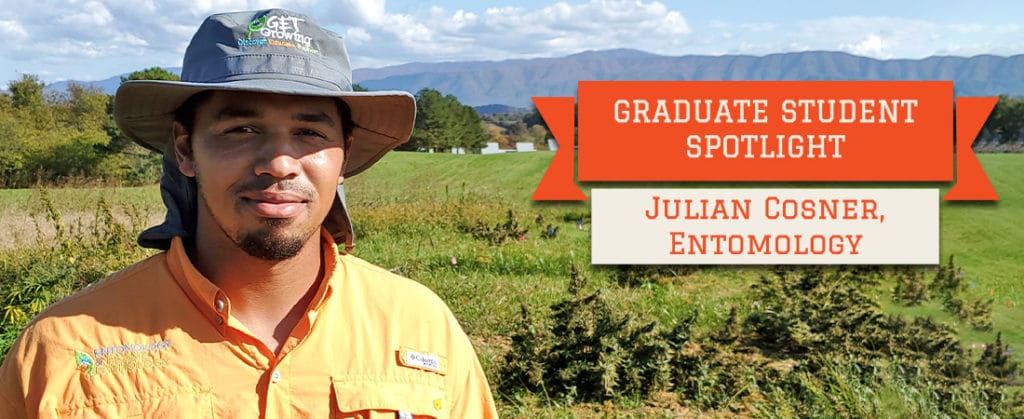Industrial hemp is a newly emerging agricultural market in Tennessee, but there is a need for more research, state-of-the-art tools, and methods of production to advance the industry. Julian Cosner, a doctoral candidate in the Department of Entomology and Plant Pathology, is hoping to fill that gap by providing pest management strategies for Tennessee hemp growers.
The 2018 Farm Bill legalized the production of hemp as an agricultural commodity and removed it from the list of controlled substances. Due to the novel nature of the crop, however, there is little current guidance for growers. Production ground to a halt in the 20th century when federal policies, tightened by the Controlled Substances Act of 1970, virtually banned the production of industrial hemp. After almost five decades, however, the production of industrial hemp is legal nationwide and represents a potential new source of agricultural income.
The goal of Cosner’s research is to not only provide technical assistance to growers, but also to increase the economic viability of the crop, especially in Tennessee.
“It can be difficult for farmers to make a living. There is enormous pressure to generate enough production to be profitable,” Cosner explained. “Farmers are also facing the added challenge of losing about 35 percent of their crops, and potential revenue, to pests and diseases. If my research can reduce that loss for hemp growers, it can have a huge financial impact.”
Cosner is working to provide guidance on Integrated Pest Management (IPM), which is a sustainable approach to reducing agricultural pests by focusing on non-chemical strategies rather than traditional pesticides. His research examines the most impactful pest in hemp—the corn earworm. This pest is particularly damaging because, in its larval form, it feeds solely on the bud of the hemp plant, which is the marketable portion of the crop when it’s grown for cannabidiol (CBD). Because 95 percent of growers in Tennessee are growing for CBD, this research is particularly critical.
Pest infestations vary by region, and Cosner is hoping to provide information that is specific to the southeast, and Tennessee in particular. He is currently researching different varieties of hemp to check for variation in impact resulting from corn ear worm infestations. If it can be determined that certain varieties are less affected by the pest, then growers can reduce their loss and increase their profit margin.
As a native of Knoxville and a UT alumnus, Cosner is excited to continue his graduate work at UT. While discussing options with his professors, he was given several options for graduate research topics. “Out of the choices that I was given, I chose to go with hemp since it was a fairly new market,” Cosner said. “It allowed me to get my foot in the door with an emerging product.”
Cosner hopes his research will help position the university as the authority for the emerging agricultural market. “It’s important for growers to know that UT is doing this research and that we are poised to be the hub of information for a growing hemp industry,” said Cosner. “Hemp could be a significant source of revenue in Tennessee in the future, and UT can play an important role in helping growers become profitable.”
After his first semester of graduate school, Cosner was presented with the opportunity to apply for the Tennessee Doctoral Fellowship program, which provides financial assistance to doctoral candidates. Cosner was one of five recipients of the prestigious award, which is funded by the Tennessee Higher Education Commission and UT’s Graduate School. This support has allowed Cosner to focus on research and professional development, without the burden of the financial pressure that often accompanies graduate work.
Similarly, he hopes his research can help release other Tennessee families from financial burden by helping them establish a stable source of income. “I know growers that are putting their kids through college with hemp money,” Cosner explained. “If we can give them information that helps them be more successful, it can help them better provide for their families.”
